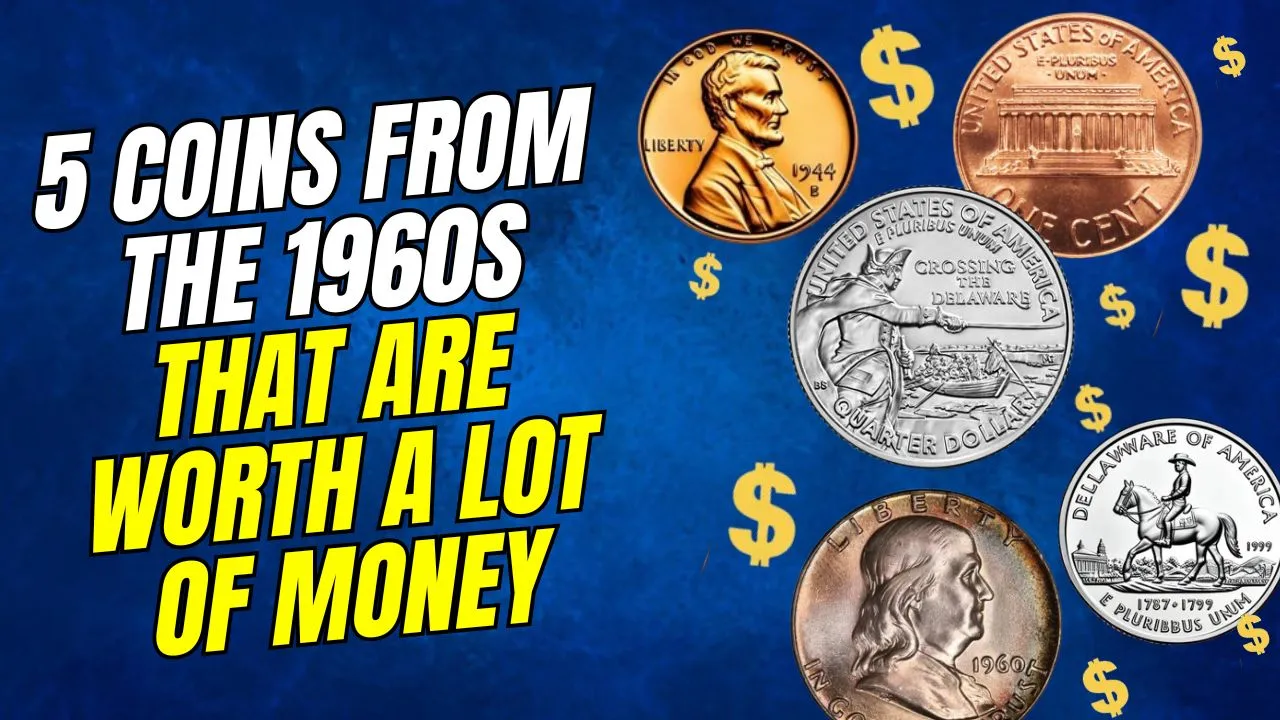Coins from the 1960s hold a special place in the world of collectibles. While many of these coins were mass-produced and spent years in circulation, some have become rare treasures worth far more than their face value. For collectors and enthusiasts, these coins are not just pieces of history—they can be profitable investments if you know what to look for.
In this article, we’ll uncover five valuable 1960s coins that may be hidden in your collection or even in everyday places like your spare change jar. From silver quarters to unique pennies, these coins have captured the interest of collectors worldwide for their rarity, unique features, and potential high value.
Overview: 5 Valuable Coins From the 1960s
| Coin Name | Key Features | Estimated Value |
|---|---|---|
| 1963-D Silver Washington Quarter | Rare in uncirculated condition | Up to $24,000 |
| 1965 Type 2 Clad Washington Quarter | Limited in gem BU condition | $12,650+ |
| 1962-D Silver Washington Quarter | High silver content and scarcity | Up to $18,400 |
| 1960 Penny (No Mint Mark) | Deep Cameo proof coins | Up to $2,600 |
| 1960 Ben Franklin Half Dollar | Silver composition, scarce in mint form | $300+ or $11 for silver content |
1. 1963-D Silver Washington Quarter
The 1963-D Silver Washington Quarter is a classic collectible from the Denver Mint. Over 135 million of these coins were produced, but finding one in pristine, uncirculated condition is exceptionally rare. Many were heavily circulated, leaving few untouched examples for today’s collectors.
- Why it’s valuable: An uncirculated version of this coin, with sharp details and no wear, can sell for up to $24,000 at auction.
- Rarity factor: Limited numbers exist in high grades, making it a sought-after piece for collectors.
- Historical significance: Contains 90% silver, making it valuable for both numismatists and silver investors.
2. 1965 Type 2 Clad Washington Quarter
1965 was a turning point for U.S. coinage, as the Mint transitioned from silver to clad compositions. While millions of quarters were minted that year, the Type 2 Clad Washington Quarter stands out as a rare collector’s item.
- Why it’s valuable: Minted during a nationwide coin shortage, this quarter is hard to find in brilliant uncirculated (BU) condition.
- Auction record: A gem BU example of this coin sold for $12,650 in 2005.
- Collector demand: This quarter proves that even non-silver coins can hold significant value when rare.
3. 1962-D Silver Washington Quarter
Another standout piece from the 1960s is the 1962-D Silver Washington Quarter, minted in Denver. These quarters contain 90% silver, adding intrinsic value. However, what sets this coin apart is its appeal to collectors due to its scarcity in uncirculated form.
- Why it’s valuable: A high-grade 1962-D quarter can sell for up to $18,400.
- Silver content: Even in worn condition, these quarters are valuable due to their silver composition.
- Historical appeal: A significant piece of pre-1965 U.S. coinage, which collectors cherish.
4. 1960 Penny (No Mint Mark, Deep Cameo Proof)
While pennies are often overlooked, the 1960 Penny with no mint mark is an exception. This specific penny is highly prized, especially those featuring a Deep Cameo proof design.
- Why it’s valuable: Proof pennies like these were produced in limited numbers, making them rare.
- Auction value: In top condition, this coin has sold for up to $2,600.
- Collector interest: The contrast between the frosted details and mirrored background makes proof coins stand out.
5. 1960 Ben Franklin Half Dollar
The 1960 Ben Franklin Half Dollar is one of the last of its kind, as the Kennedy Half Dollar replaced it in 1964. This coin contains 90% silver, making it valuable even for its melt value.
- Why it’s valuable:
- The silver content alone is worth around $11 to $12.
- A mint-condition Franklin Half Dollar can fetch over $300.
- Collector demand: Its historical significance and scarcity in top condition make it a desirable coin.
Why Are These Coins So Valuable?
Several factors contribute to the high value of 1960s coins:
- Rarity – Coins with limited surviving examples or unique features are often worth more.
- Metal Content – Many coins from this era contain silver, which has increased in value over time.
- Condition – Coins in uncirculated or mint condition are far more desirable than worn-out ones.
- Collector Demand – Coins with historical or aesthetic significance tend to attract higher bids.
How to Identify and Preserve Valuable Coins
If you think you have a valuable coin, follow these steps:
Inspect Your Collection – Look for rare dates, mint marks, and unique features.
Use Proper Storage – Keep coins in protective holders to avoid damage.
Avoid Cleaning Coins – Cleaning can reduce a coin’s value significantly.
Get an Expert Opinion – Consult a professional coin grading service like PCGS or NGC.
Final Thoughts
The coins of the 1960s hold a wealth of history and value, making them an exciting find for collectors. Whether you’re starting your collection or looking to uncover hidden treasures, these coins could turn into valuable assets.
If you’ve enjoyed this guide, share it with fellow collectors or leave a comment below about your coin discoveries. Start exploring your own collection today—you never know what hidden treasures you might find!
